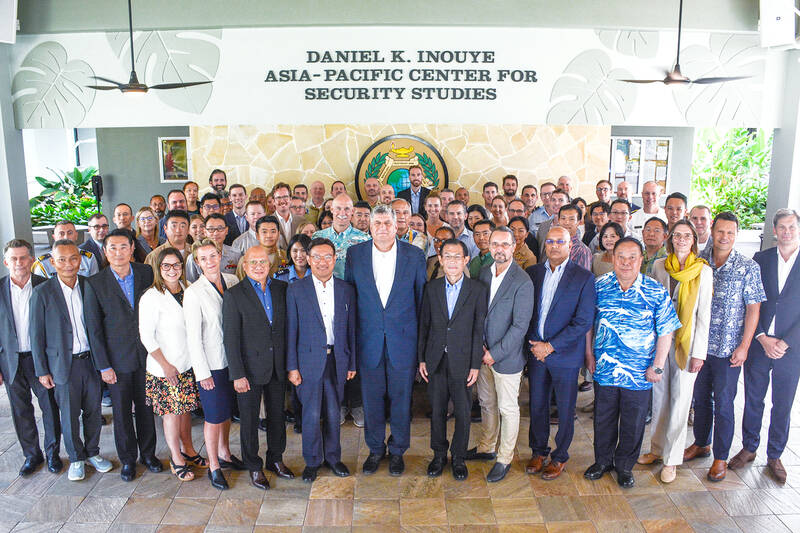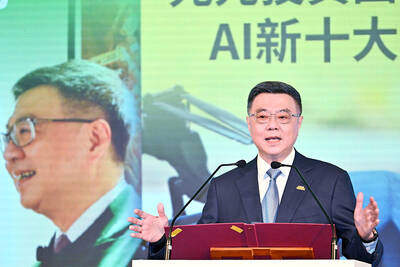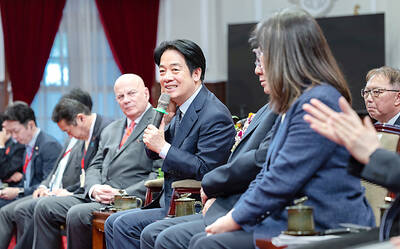Taiwan’s participation in the US-led Partnership for Indo-Pacific Industrial Resilience (PIPIR) signaled a boost to the nation’s quest to produce arms under license or in conjunction with original manufacturers, an expert said.
The group on Tuesday and Wednesday held its inaugural conference in Honolulu, Hawaii.
High-ranking defense officials representing US-friendly governments attended the meeting, including Deputy Minister of National Defense Hsu Yen-pu (徐衍璞), a photograph released by the Pentagon on Thursday showed.

Photo courtesy of the US Department of Defense via CNA
The US Department of Defense said that 13 nations and territories in the Indo-Pacific region and the Atlantic Europe region took part as members, but it did not identify the governments by name.
Headed by US Undersecretary of Defense for Acquisition and Sustainment William LaPlante, the discussions delved into industry maintenance, sustainment chains, production and policy aspects of resilience, the Pentagon said.
“The establishment of PIPIR directly supports [the Pentagon’s] implementation of the National Defense Industrial Strategy and Regional Sustainment Framework, which emphasizes the importance of strengthening international defense production and sustainment relationships,” it said.
Cooperation between members would bolster their defense industrial bases, production volume, workforces, innovation, information sharing, standardization and resilience, it said, adding the partnership extends to the private sector.
An industry advisory committee would be established as a permanent body that the group runs, it said.
Recent events have opened the door to joint arms production between Taiwan and the US, former US Marine Corps Forces Pacific commander Steven Rudder told the Atlantic Council at a meeting in Washington.
The US is pursuing joint solutions to increase arms production via myriad arrangements, including AUKUS, and forging a security alliance with Japan and the Philippines, Rudder said.
Taiwan has expressed interest in becoming part of the US-led joint arms production scheme, a request that should be granted, as sustaining the nation during a conflict and building materiel stockpiles are significant challenges, he said.
Joint or licensed arms production is arranged on the foundation of trust and Taiwan has long been a trustworthy US ally, US-Taiwan Chamber of Commerce vice president Lotta Danielsson said, citing bilateral cooperation in the technology sector.

Two US House of Representatives committees yesterday condemned China’s attempt to orchestrate a crash involving Vice President Hsiao Bi-khim’s (蕭美琴) car when she visited the Czech Republic last year as vice president-elect. Czech local media in March last year reported that a Chinese diplomat had run a red light while following Hsiao’s car from the airport, and Czech intelligence last week told local media that Chinese diplomats and agents had also planned to stage a demonstrative car collision. Hsiao on Saturday shared a Reuters news report on the incident through her account on social media platform X and wrote: “I

STILL ON THE TABLE: The government is not precluding advanced nuclear power generation if it is proven safer and the nuclear waste issue is solved, the premier said Taiwan is willing to be in step with the world by considering new methods of nuclear energy generation and to discuss alternative approaches to provide more stable power generation and help support industries, Premier Cho Jung-tai (卓榮泰) said yesterday. The government would continue to develop diverse and green energy solutions, which include considering advances in nuclear energy generation, he added. Cho’s remarks echoed President William Lai’s (賴清德) comments in an interview last month, saying the government is not precluding “advanced and newer nuclear power generation” if it is proven to be safer and the issue of nuclear waste is resolved. Lai’s comment had

‘BUILDING PARTNERSHIPS’: The US military’s aim is to continue to make any potential Chinese invasion more difficult than it already is, US General Ronald Clark said The likelihood of China invading Taiwan without contest is “very, very small” because the Taiwan Strait is under constant surveillance by multiple countries, a US general has said. General Ronald Clark, commanding officer of US Army Pacific (USARPAC), the US Army’s largest service component command, made the remarks during a dialogue hosted on Friday by Washington-based think tank the Center for Strategic and International Studies. Asked by the event host what the Chinese military has learned from its US counterpart over the years, Clark said that the first lesson is that the skill and will of US service members are “unmatched.” The second

STANDING TOGETHER: Amid China’s increasingly aggressive activities, nations must join forces in detecting and dealing with incursions, a Taiwanese official said Two senior Philippine officials and one former official yesterday attended the Taiwan International Ocean Forum in Taipei, the first high-level visit since the Philippines in April lifted a ban on such travel to Taiwan. The Ocean Affairs Council hosted the two-day event at the National Taiwan University Hospital International Convention Center. Philippine Navy spokesman Rear Admiral Roy Vincent Trinidad, Coast Guard spokesman Grand Commodore Jay Tarriela and former Philippine Presidential Communications Office assistant secretary Michel del Rosario participated in the forum. More than 100 officials, experts and entrepreneurs from 15 nations participated in the forum, which included discussions on countering China’s hybrid warfare